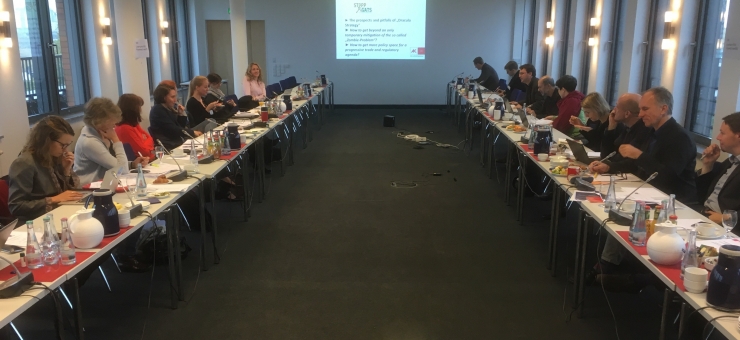New trade information - TiSA sneaking towards conclusion?

Berlin, October 25
Christina Colclough, UNI Global Union’s Senior Advisor on trade was in Berlin this week together with over 30 experts from the global and national union movement and civil society organisations to discuss the newest developments in the trade deals TiSA, CETA, TPP and TTIP. Colclough comments: “When you start unravelling these trade deals, finding how they interlink and discuss with the lawyers the implications of each text, it spells bad news for democracy, fundamental rights, our climate and our societies. The devil really is in the detail.”
At the meeting, several new insights were shared and discussed, especially on TiSA but also on the Wallonian government’s no to CETA. On TiSA we now know three important developments:
Firstly, we were informed that the negotiating parties aim to conclude TiSA by the end of this year. Leading up to the signing the following dates are key:
Nov 2-10: a 9-day negotiation round will take place in Geneva;
Dec 5-6: the “final negotiations” Ministerial in Geneva, where TiSA is hoped to be signed.
This rapid timeline means that we must continue to question our governments and demand that trade agreements safeguard democratic standards, the public interest and put people first.
Secondly, we have been informed that eight of the TiSA annexes have been agreed on and will be kept in the agreement. These are: financial services, e-commerce, telecommunications, localization, transparency, professional services, a trimmed State Owned Enterprises and a reduced Mode 4 if the US succeeds in carving it out. The annexes that seem most problematic and are likely to be dropped are Government Procurement, Maritime, Road Transport, Postal/Logistics, Health Exports; and the Environmental Annex.
Thirdly, a group of powerful MNCs have called to future proof TiSA in the name of digitalisation. TiSA, as we know, is concerned with trade in services. The MNCs want to introduce something called Mode 5 - for services that are embedded in a good. They claim, for example, that sneakers that include an activity monitor, or a car’s computer are not shoes or cars. They are more services. The activity monitor offers you the user a service by urging you to move more, or by celebrating you for moving lots. The car’s computer (think Tesla) keeps you hands free on the road, starts the car, warms it up and soon will take you from A to B without you touching a peddle or a wheel. That car is doing you a service.
So goods essentially become a service. And that would mean – if the push from these powerful companies is listened to – that almost everything, every good, service, thing and piece of data will be included into TiSA. And that means full liberalisation, full privatisation and an all-out hamper on local, regional and national government’s scope to regulate in the interests of their citizens.
General Secretary, Philip Jennings comments: “Although the Wallonian government has been widely accused of taking democracy hostage by blocking CETA, we actually must thank them for listening to the public’s discontent with these trade agreements. I can only imagine that when the full truth about TiSA is known, the protests will grow.”

